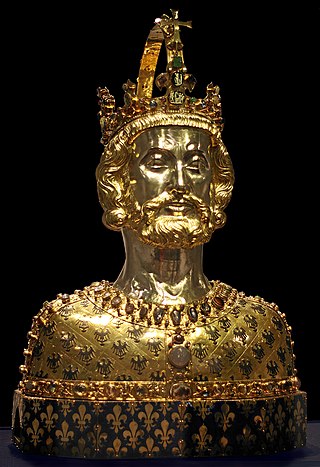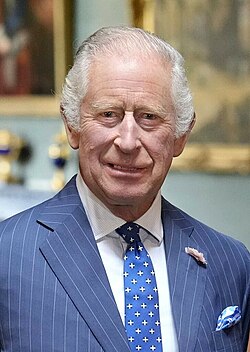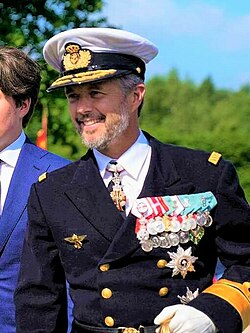Top Qs
Timeline
Chat
Perspective
King
Title given to a male monarch From Wikipedia, the free encyclopedia
Remove ads
King is a royal title given to a male monarch. A king is an absolute monarch if he holds unrestricted governmental power or exercises full sovereignty over a nation. Conversely, he is a constitutional monarch if his power is restrained by fixed laws. Kings are hereditary monarchs when they inherit power by birthright and elective monarchs when chosen to ascend the throne.
- In the context of prehistory, antiquity and contemporary indigenous peoples, the title may refer to tribal kingship. Germanic kingship is cognate with Indo-European traditions of tribal rulership (cf. Indic rājan, Gothic reiks, and Old Irish rí, etc.).
- In the context of classical antiquity, king may translate in Latin as rex and in Greek as archon or basileus.
- In classical European feudalism, the title of king as the ruler of a kingdom is understood to be the highest rank in the feudal order, potentially subject, at least nominally, only to an emperor (harking back to the client kings of the Roman Republic and Roman Empire).[1]
- In a modern context, the title may refer to the ruler of one of a number of modern monarchies (either absolute or constitutional). The title of king is used alongside other titles for monarchs: in the West, emperor, grand prince, prince, archduke, duke or grand duke, and in the Islamic world, malik, sultan, emir or hakim, etc.[2]
- The city-states of the Aztec Empire each had a tlatoani. These were the kings of pre-Hispanic Mesoamerica. The Huey Tlatoani was the emperor of the Aztecs.[3]
This article has multiple issues. Please help improve it or discuss these issues on the talk page. (Learn how and when to remove these messages)
|

The term king may also refer to a king consort, a title that is sometimes given to the husband of a queen regnant, but the title of prince consort is more common.
Remove ads
Etymology
The English term king is derived from the Anglo-Saxon cyning, which in turn is derived from the Common Germanic *kuningaz. The Common Germanic term was borrowed into Estonian and Finnish at an early time, surviving in these languages as kuningas. It is a derivation from the term *kunjom "kin" (Old English cynn) by the -inga- suffix. The literal meaning is that of a "scion of the [noble] kin", or perhaps "son or descendant of one of noble birth" (OED).
The English term translates, and is considered equivalent to, Latin rēx and its equivalents in the various European languages. The Germanic term is notably different from the word for "King" in other Indo-European languages (*rēks "ruler"; Latin rēx, Sanskrit rājan and Irish rí; however, see Gothic reiks and, e.g., modern German Reich and modern Dutch rijk).
Remove ads
History
Summarize
Perspective
The English word is of Germanic origin, and historically refers to Germanic kingship, in the pre-Christian period a type of tribal kingship. The monarchies of Europe in the Christian Middle Ages derived their claim from Christianisation and the divine right of kings, partly influenced by the notion of sacral kingship inherited from Germanic antiquity.
The Early Middle Ages begin with a fragmentation of the former Western Roman Empire into barbarian kingdoms. In Western Europe, the kingdom of the Franks developed into the Carolingian Empire by the 8th century, and the kingdoms of Anglo-Saxon England were unified into the kingdom of England by the 10th century.
With the breakup of the Carolingian Empire in the 9th century, the system of feudalism places kings at the head of a pyramid of relationships between liege lords and vassals, dependent on the regional rule of barons, and the intermediate positions of counts (or earls) and dukes. The core of European feudal manorialism in the High Middle Ages were the territories of the former Carolingian Empire, i.e. the kingdom of France and the Holy Roman Empire (centered on the nominal kingdoms of Germany and Italy).[4]
In the course of the European Middle Ages, the European kingdoms underwent a general trend of centralisation of power, so that by the Late Middle Ages there were a number of large and powerful kingdoms in Europe, which would develop into the great powers of Europe in the Early Modern period.
- Most famously, in Western Europe, the western part of the Carolingian Empire became Francia Occidentalis (West Francia) and developed into the Kingdom of France covering at its height all the lands between the Atlantic and the Rhine. Its fragmented several times into almost independent states, but was several times the preeminent military and cultural power in Europe. Its monarch evolved from "Francorum Rex Occidentalis" (king of the Western Franks) to "Franciae Rex" ("King of France") and in French "Roi de France" (see Style of the French sovereign). Under the French Empire this was Emperor of the French and under the constitutional monarchy King of the French.
- On the British Isles, coalescing around the Kingdom of England, the King of England, which came to preeminence and incorporated in one way or the other Scotland, Wales and Ireland
- In the Iberian Peninsula, the remnants of the Visigothic Kingdom, the petty kingdoms of Asturias and Pamplona, expanded into the kingdom of Portugal, the Crown of Castile and the Crown of Aragon with the ongoing Reconquista.
- In southern Europe, the kingdom of Sicily was established following the Norman conquest of southern Italy. The Kingdom of Sardinia was claimed as a separate title held by the Crown of Aragon in 1324. In the Balkans, the Kingdom of Serbia was established in 1217.
- In central Europe, the Kingdom of Hungary was established in AD 1000 following the Christianisation of the Magyars. The kingdoms of Poland and Bohemia were established in 1025 and 1198, respectively.
- In eastern Europe, the Grand Duchy of Moscow did not technically claim the status of kingdom until the early modern Tsardom of Russia.
- In northern Europe, the tribal kingdoms of the Viking Age by the 11th century expanded into the North Sea Empire under Cnut the Great, king of Denmark, England and Norway. The Christianization of Scandinavia resulted in "consolidated" kingdoms of Sweden and Norway, and by the end of the medieval period the pan-Scandinavian Kalmar Union.
By the end of the Middle Ages, the kings of these kingdoms would start to place arches with an orb and cross on top as an Imperial crown, which only the Holy Roman Emperor had had before. This symbolized them holding the imperium and being emperors in their own realm not subject even theoretically anymore to the Holy Roman Emperor.
Remove ads
Contemporary kings
Summarize
Perspective
Currently (as of 2023[update]), eighteen kings are recognized as the heads of state of sovereign states (i.e. monarchs whose native titles are officially or commonly rendered in English as king).
Most of these kings serve as heads of state in constitutional monarchies. However, those ruling over absolute monarchies include the King of Saudi Arabia and the King of Eswatini.[5]
Remove ads
See also
Remove ads
Notes
References
External links
Wikiwand - on
Seamless Wikipedia browsing. On steroids.
Remove ads


















